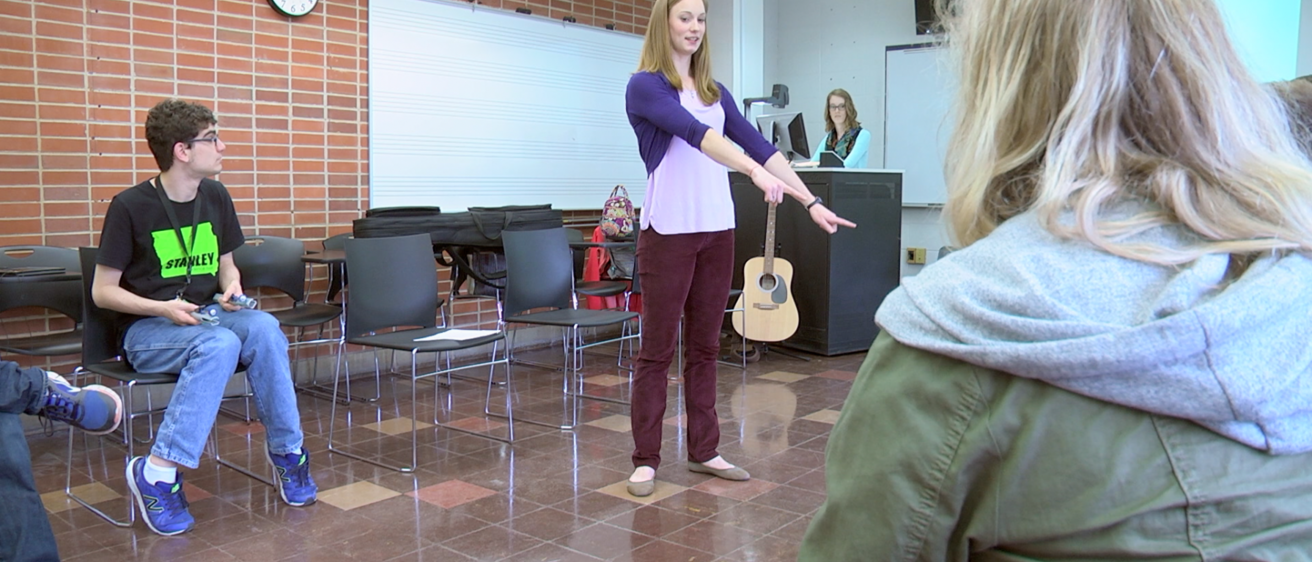When Alisha Luymes discovered music therapy, she said she knew she had found her calling.
"It brings together two things that are dear to me," says Luymes, a third-year University of Iowa music therapy graduate research assistant from Wessington Springs, South Dakota. "I love music and I love helping people, so when I found out that music therapy existed, I was interested immediately."
The UI music therapy program is one of only two in the Big Ten, and its graduate program is ranked among the top 25 in the country. Undergraduate and graduate students are trained for careers as professional music therapists, whether that means establishing their own private practice or working in a hospital setting like the three board-certified music therapists employed by UI Hospitals and Clinics.
Music therapy includes various applications of music in a therapeutic relationship to address physical, cognitive, and social needs. For example, research has shown that Alzheimer's patients—whose short- and long-term memory progressively diminishes—who receive music therapy have temporarily improved memory recall and responsiveness. Therapists can lead a group in songs that patients knew at a younger age, which can decrease the frequency of agitated and aggressive behaviors and improve patients’ awareness of their environment.
Who benefits from music therapy?
Dementia clients
Activities: Singing familiar songs from their early years
Effects: Regaining alertness and awareness of self and environment; can help low-functioning patients focus and relax; can reduce agitation, confusion, and erratic behavior; helps visiting family members connect with their relative better; research shows that the patient's positive mood can linger after the therapy session has ended, even if they have forgotten about it
UI REACH students
The University of Iowa REACH Program is a two-year, transition certificate program o in the College of Education for students with multiple intellectual, cognitive, and learning disabilities.
Activities: Leading students through music lessons; encouraging them to create their own rhythms
Effects: Learning to listen to others and take turns; assuming leadership roles; taking pride in mastering a skill; improving self-esteem
Palliative (end-of-life) clients
Activities: Singing for or with the patient and family
Effects: Reduces pain and anxiety; helps family connect and feel close
Veterans dealing with PTSD, substance abuse, and depression
Activities: Learning to play instruments; songwriting
Effects: Coping with trauma; managing stress; using music as a creative outlet; helping veterans share their experiences and feel understood by their peers
For the family members and loved ones of patients, attending sessions provides an opportunity to connect and interact in a prolonged, positive way that might no longer be possible otherwise. Research shows that the positive mood patients experience during therapy can linger throughout the day, even after they have forgotten about the session itself.
"Research concerning the full medical benefits of music therapy for dementia patients is still being conducted," says Mary Adamek, director of UI's undergraduate music therapy program. "But it's one of the many cognitive or developmental conditions music therapy can help address."
The program is headed by Adamek, former president of the American Music Therapy Association, and Kate Gfeller, director of the graduate program and co-author of the textbook, An Introduction to Music Therapy Theory and Practice. Adamek and Gfeller have worked at the UI for 20 and 31 years, respectively.
The program has seen steady growth under their guidance and, despite the 2008 flood reducing the total undergraduate enrollment in the School of Music, the music therapy program continued and continues to grow.
After enrollment into the program, which includes a musical audition, undergraduate students are put on a track to secure professional certification for music therapy by the time of their graduation.
Typically, during a student's junior year, they progress from observing music therapy sessions to having supervised clinical experiences with clients in various treatment settings.
"Our students do hands-on work with Iowa City schools, community programs for individuals with mental health needs, and elderly care facilities all across Iowa," says Adamek. "This prepares them to find work in hospitals all over the country, as many of our alumni are currently doing."
After their academic coursework has been fulfilled, students complete a six-month internship at one of several hundred approved clinical sites across the country. The range of clients includes those on the autism spectrum and military veterans, whom students work with to help address illnesses including post-traumatic stress disorder, substance abuse, and depression.
"The program here has ensured that I work with a wide range of clients," says Luymes. "I've worked with preschool-age clients, the elderly, and college-age students through the UI REACH program."
The music therapy and UI REACH programs collaborate in weekly sessions where music therapy students work with UI REACH members as part of their practicum. UI REACH is a two-year, transition certificate program in the College of Education for students with intellectual, cognitive, and learning disabilities. The sessions help UI REACH students learn useful social skills by encouraging them to learn and create music.
"These sessions emphasize teamwork, sharing their thoughts and feelings, and displaying leadership qualities," says Luymes. "It helps instill positive habits, including taking turns, listening to others, and assuming leadership roles. Learning to take pride in mastering skills is also crucial to the development of their self-esteem."
As the field continues to expand, students such as Luymes are setting ambitious goals—ready to capitalize on an emerging career field.
"I'll be starting an internship in the Quad Cities soon," says Luymes. "Eventually, I want to start my own music therapy business back in South Dakota."
